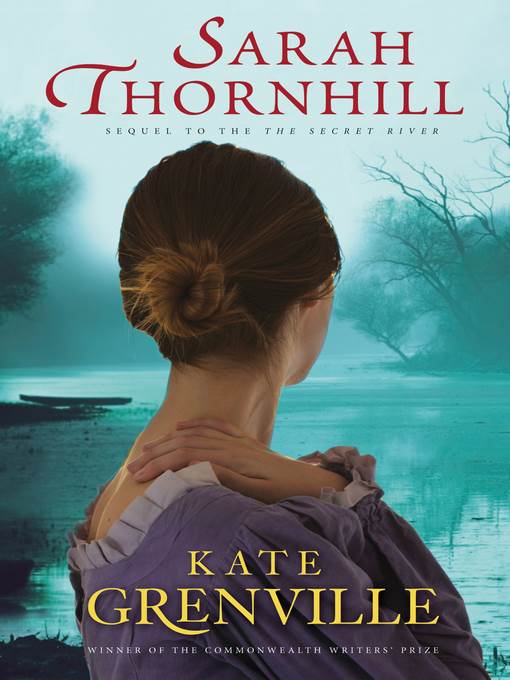
Sarah Thornhill
- اطلاعات
- نقد و بررسی
- دیدگاه کاربران
نقد و بررسی

April 2, 2012
The final novel in Grenville’s trilogy about the British colonization of New South Wales continues her exploration of the savagery with which emancipated convict settlers ousted the indigenous peoples. The novel, which can be read as a stand-alone, is told from the point-of-view of Sarah, the youngest child of William Thornhill, the conflicted protagonist in The Secret River. From early childhood, Sarah senses her father’s troubles, and eventually discovers their terrible source. Her disillusionment will highlight the novel’s central question: is it possible to both thrive as an individual and sufficiently atone for the sins of one’s ancestors? Sarah’s affair with her brother’s closest friend, whose mother was an Aborigine, is squashed by Sarah’s wicked stepmother, more cliché than character. Sarah then marries an English Protestant from Ireland, whose background Grenville exploits nicely: usurpers can be found on any continent. Lyrical passages light up the narrative, and Grenville’s profound themes make it tempting to ignore the novel’s flaws. Sarah lacks the complexity and credibility of protagonists in the earlier novels, and Grenville postpones the reveal of the family’s secrets for too long, perplexingly, as they were already revealed in The Secret River. Agent: Canongate Books, Scotland.

Starred review from July 1, 2012
The saga of the Thornhill clan in early-19th-century Australia concludes in the final volume of Commonwealth Writer's Prize winner Grenville's (The Secret River, 2006, etc.) trilogy. Sarah Thornhill is the youngest daughter of William Thornhill, a man "sent out" from England in 1806 to New South Wales. Years later, with Sarah on the cusp of womanhood, Thornhill has become a prosperous river freighter, landowner and landlord of Thornhill's Point along the Hawkesbury River. Sarah's voice illuminates the tale, a voice true to a woman left illiterate in a time when land and sheep were treasured more than learning from a book. While the story is fictional, the book instructs on Australia's early history: the land; the wealth to be made from sheep, seals and whales; the conflict between those who had "worn the broad arrow," arriving as convicts, and those who came from proper society; and the oppressive and often bloody relationship between white settlers and the aboriginal people, termed "blacks." The latter element provides the fundamental conflict within the novel, with Sarah falling in love with Jack Langland, a neighbor's half-aboriginal son and sailing partner of Sarah's older brother. Because of an ugly family secret, revealed only to Jack by Sarah's abusive stepmother, marriage between the two is impossible. Instead Sarah marries John Daunt, a wealthy Irishman, who owns a sheep farm out near the Limit of Location. When Sarah is sent word that her father is dying, she travels to Thornhill's Point and learns the secret that kept Jack from marrying her. "Once you knew, there was no way to not know." Jack soon returns from New Zealand, where he's married a Maori woman, and asks Sarah to fulfill an obligation that might lead to a measure of reconciliation. Beautifully written, with sufficient backstory to be enjoyed without first reading the previous two installments, this novel can be read as a dissection of a cultural clash or an allegory for colonialism, but at heart, the novel uses fiction to search for reason within history.
COPYRIGHT(2012) Kirkus Reviews, ALL RIGHTS RESERVED.

January 1, 2012
Grenville wraps up the trilogy begun with The Secret River, winner of the Commonwealth Writers' Prize, with a story featuring Sarah, the youngest child of River's pioneer William Thornhill. The first two books were memorable, so I'm anticipating. With a reading group guide.
Copyright 2012 Library Journal, LLC Used with permission.

May 1, 2012
Grenville's Early Australia trilogy comes to a brilliant conclusion, after The Secret River (2006) and The Lieutenant (2009), with this novel. Kate, the youngest child of Secret River's William Thornhill, narrates the family's history, illustrating that, in this family, the iniquities of fathers are indeed visited on the children and grandchildren. William Thornhill's treatment of indigenous Australians makes Kate's first love impossible, pushes her into a mariage de convenance, and causes poorly understood upheavals in family relations. The lovingly detailed landscape of nineteenth-century New South Wales could almost be another character in the novel, strongly influencing the lives of this family. Readers experience events through the eyes and mind of intelligent, strong-willed Kate, whose impulsiveness in youth matures into self-knowledge and determination to correct at least one of her father's wrongs. Full of fascinating characters (like them or loathe them) and giving a clear picture of the lingering prejudices of the convict era in Australia, this accessible historical novel will appeal to a broad audience.(Reprinted with permission of Booklist, copyright 2012, American Library Association.)




دیدگاه کاربران